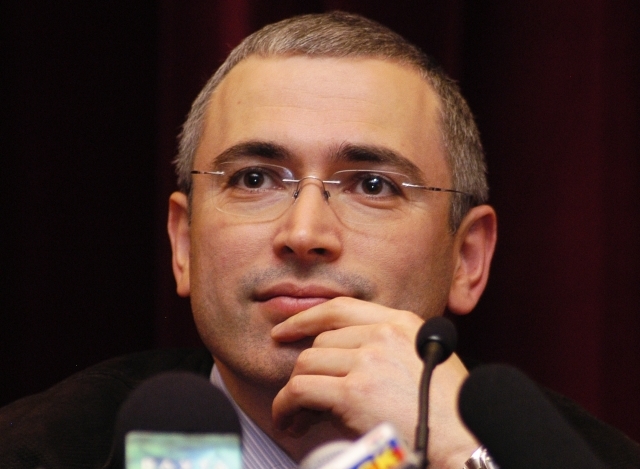
Mikhail Khodorkovsky, 1 April 2001, Press Center of Mikhail Khodorkovsky and Platon Lebedev, CC 3.0.
Mikhail Khodorkovsky, Russia’s most infamous oligarch and famous political prisoner, is scheduled to leave jail later next year, but there are now signs that he may face new criminal charges [ru] before he can breathe free air. On Friday, December 6, 2013, Deputy Prosecutor General Aleksandr Zviagintsev told [ru] Interfax News that his agency is investigating several new charges against Khodorkovsky. A source within the General Prosecutor’s office told Interfax that the new case against the former oil tycoon involves the alleged laundering of over ten billion dollars, including efforts to use that money “to alter Russian legal statues.” Vladimir Markin, the spokesman for Russia’s Investigative Committee (another police branch of the federal government and a bureaucratic rival to the General Prosecutor), refused to comment [ru] on Zviagintsev’s revelation.
If Khodorkovsky returns to court to face money-laundering charges, it would be his third consecutive trial. Arrested in October 2003, he has spent over a decade in prison, convicted of fraud and tax evasion in 2005 and embezzlement in 2011.
Though the news of a possible third case against Khodorkovsky is still just hours old, many prominent liberal journalists are already expressing their anger in posts on Facebook and Twitter, ahead of what will undoubtedly be many disapproving articles and op-eds.
Journalist Yuri Saprykin was at a loss for words, writing [ru] on Facebook:
третье дело. слов уже никаких не осталось.
A third case. There aren’t even any words left.
Another journalist, Anton Krasovsky, joked [ru]:
Бог троицу любит.
God loves a trinity.
Ekaterina Vinokurova saw [ru] the possibility of a new trial as insulting:
Новое дело против Ходорковского – это какое-то издевательство уже.
A new case against Khodorkovsky. They’re just using him as a punching bag now.
Writing on Facebook, Tikhon Dzyadko expressed [ru] eagerness to know how Dmitri Medvedev’s press secretary, Natalia Timakova, will respond to the news. In comments on Dzyadko’s post, others faulted him for looking to Medvedev rather than Putin, though Dzyadko insisted that there is nothing wrong with addressing Russia’s “number two” political figure. (Dzyadko has a history of asking Timakova uncomfortable questions on Facebook. In August last year, he criticized [ru] her for a lavish vacation in Italy.)
In another post on Facebook, journalist Dmitri Bavyrin bleakly downplayed the shock of Zviagintsev’s announcement about new charges against Khodorkovsky, writing [ru]:
А что Ходорковского живым не выпустят – это, извините, давно понятно было.
I’m sorry, but it’s long been clear that Khodorkovsky will never be released while he’s still alive.
Political analyst Fyodor Krasheninnkov echoed this sentiment on Twitter:
Ходорковский может оказаться на свободе только после того как кончится Путин. Верить в иное – самообман и наивность. Как ни печально
— Фёдор Крашенинников (@Fyodorrrrr) December 6, 2013
Khodorkovsky can go free only after the end of Putin. Believing anything else is self-deception and naiveté. Sad as it sounds.
Still, others are optimistic that Khodorkovsky could yet emerge from prison. Stanislav Yakovlev (aka Ortega, aka Kreutzwald) wrote on Twitter that he is confident state prosecutors will not have time to complete a new case against Khodorkovsky and his business partner Platon Lebedev before their current sentences expire.
@ruxaland Я о том, что пока дело будут раскачивать – Ходорковский и Лебедев окажутся на свободе к тому времени.
— Kreutzwald (@Kreutzwald) December 6, 2013
I’m saying that Khodorkovsky and Lebedev will go free, while [prosecutors] build up the [new] case.
Interfax’s Prosecutor General source says that formal charges against Khodorkovsky (as either a witness or a suspect) are just a “matter of time.” If a case is indeed imminent, it’s strange that the Investigative Committee’s representative is so reticent to comment now. In the Committee’s past persecution of the Kremlin’s political pests, like Alexey Navalny, Markin has been far more eager to grandstand for reporters. Could this restraint indicate that the investigation has a way to go, as Yakovlev argues, or does it mean that the Prosecutor General is now leading the way?








1 comment